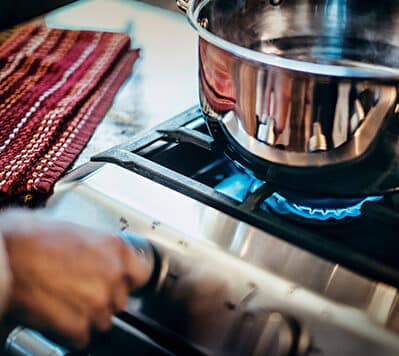Cooking with Propane Gas vs Electric Stoves
Cooking is considered an art form, and to create the best art, one needs the best tools. For professional chefs and other serious foodies, that means gas-powered cooking appliances. The visual feedback provided by a bright blue flame on a propane stove cannot be replicated by an electric or induction stovetop.
More than 96% of professional chefs prefer cooking with gas because of the convenience, ease, and control it provides in preparing the meal. In addition to the performance benefits, homeowners are also drawn to propane appliances because of their energy efficiency, low environmental impact, and sleek designs.
Using propane in the kitchen has many practical advantages. Cooking with propane allows for easy temperature control, with near-instant response times. Unlike electric stoves, propane burners are instant on and off, so the cooking can start and stop exactly when you want. That means less time wasted waiting for the range to get hot and almost no chance of accidentally over-cooking your favorite dish.
Propane carries other benefits as well. Using propane instead of electricity to cook can reduce a home’s CO₂ emissions by up to 30% each year. Besides reduced emissions, homeowners will have lower utility costs, too. The average cost of electricity in Missouri is almost twice the cost of propane on a BTU basis, so the savings really add up with propane. These benefits are realized with propane appliances, especially with new state-of-the-art appliances.
Cook Like a Professional
House Beautiful magazine recently celebrated “The Year of the Living Kitchen,” emphasizing the blend of function and technology transforming this important workspace. This is still true today. From simmering to searing, gas stoves are preferred over electric stoves by most home chefs who are trying to impress their friends and neighbors.
The living kitchen trend emphasizes a growing commitment to eco-friendly materials, finishes and appliances. For home chefs that do a lot of cooking, a switch to propane can make a big difference in reducing a home’s carbon footprint. Propane is a low-carbon fuel recognized by the EPA as a clean, non-polluting energy source. Propane appliances can reduce carbon dioxide emissions by about 30% when compared to electric appliances.
One of the newest trends in home appliances is propane-powered infrared cooking technology, which takes the traditional power and ease of cooking with propane and gives it a modern enhancement. Infrared ranges use a ceramic tile that is heated by gas combustion that radiates heat as infrared energy into the food, allowing it to be cooked faster. Additionally, infrared heat can produce higher temperatures than other heat sources, so chefs can do more kinds of cooking in the kitchen with this type of technology.
Gas vs Electric Stoves: Induction Cooking
In addition to the benefits of propane in the ‘conventional’ kitchen, many home chefs have been turning to induction cooking. Electric induction cooktops have brought some competition to the indoor range market, but propane is still preferred by serious American chefs. Although consumer reports have noted that people like the looks of modern induction cooktops, that style does not necessarily result in purchases. Since induction ranges require special cookware, recent reports suggest that consumers just aren’t willing to pay extra for an induction stovetop and then pay again to make their cookware compatible. Consumers like the look and function of a real flame. It gives better real-time feedback and lets a chef properly gauge the temperatures they are working with.
Unlike electric induction power, which can only be used in cooktops, propane-powered infrared technology can be used in ovens, grills and griddles as well. This means that the convenience of cooking with propane can be utilized throughout the kitchen, allowing home chefs to cook just like professionals. Even as styles change and new technologies come into the market, propane still stands as the choice of professional and home chefs alike because of its many benefits and rewards, including convenience, performance, energy efficiency and luxurious designs.
Learn more about the propane lifestyle.
